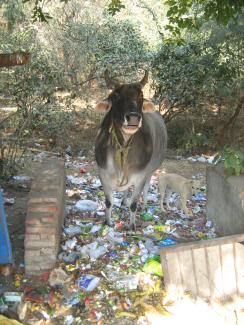Urbanisation
Slums and gated communities

Developing countries everywhere are facing a "rapid and messy urbanisation," says Gil-Hong Kim of the Asian Development Bank (ADB). City governments are grappling with often conflicting goals of eliminating poverty, creating sustainable growth, fighting corruption and caring for the environment.
The ADB expert says that building up a middle class is vital to the economic health of urban areas. But balancing the dynamic economic growth with the need to deal with poverty and protecting the environment is a huge challenge. Millions of people are moving towards urban areas every year. Kim admits that, in Asian agglomerations, more than 80 % of water and soluble waste remain untreated.
It is generally acknowledged that there is a large financing gap for infrastructure projects. Asian countries’ high savings rates have not translated into adequate investment. Kim sees a need to mobilise additional funds and to do more to make public authorities and private-sector companies cooperate on building infrastructure.
According to Kim, mayors have a huge responsibility, but he regrets that most municipal governments have neither the capacity nor the mandate to mobilise development. Typically, city governments have little authority in developing countries. Moreover, they tend to be held in low regard by the national governments that usually hold the purse strings.
William Cobbett of Cities Alliance, an international organisation that aims to fight urban poverty, agrees: "Local governments or cities are seen as an inferior form of government, very often little more than an administrative tier." In his eyes, it is necessary to turn national governments into partners for local governments. He wants cities to be empowered to raise revenues – and he wants them to be allowed to make mistakes.
While cities need more autonomy to take on additional responsibilities, they must also improve governance. Corruption, the lack of public participation in decision-making and policies that hurt marginalised people are typical of many local-level administrations. Tax collection, moreover, is difficult in places where the informal sector dominates the local economy. At a conference hosted by Germany’s Federal Ministry for Economic Cooperation and Development in Berlin in March, experts agreed that cities need:
- a social compact between the local government and its citizens,
- formal and informal structures for involving stakeholders in decisions and
- appropriate jurisdictions in relation to other tiers of government.
None of these things, however, can be taken for granted.
Cities Alliance expert Cobbett points out that no nation has been lifted out of poverty without properly functioning cities. At the same time, he is aware of the world’s poor building the cities, but often living in inhumane conditions, without basic services like waste disposal. He asks: "What are the policies that turn a shack into a house? What are the essential conditions necessary to incentivise the private sector to invest?"
One of the biggest obstacles for local authorities is that they often have little control over urban land markets. In many cities, slums are big private markets and Cobbett says the rise of such parallel property markets undermines the credibility of city governments.
Slums are indeed a huge challenge. Klaus Töpfer, the former head of the UN Environment Programme, says: "When slums appear, it is an indication that cities are not fulfilling their role." At the same time, he points out that great wealth is similarly divisive as is great poverty. In his eyes, "gated communities" for the rich are also a sign of failed urban development.
Some countries have set good examples for city growth. South Korea’s urbanisation has been among the fastest in the world, yet it has been very successful. Slums have largely been eliminated thanks to good urban governance, Cobbett says. In his eyes, other countries should take a cue from South Korea.
Ellen Thalman







